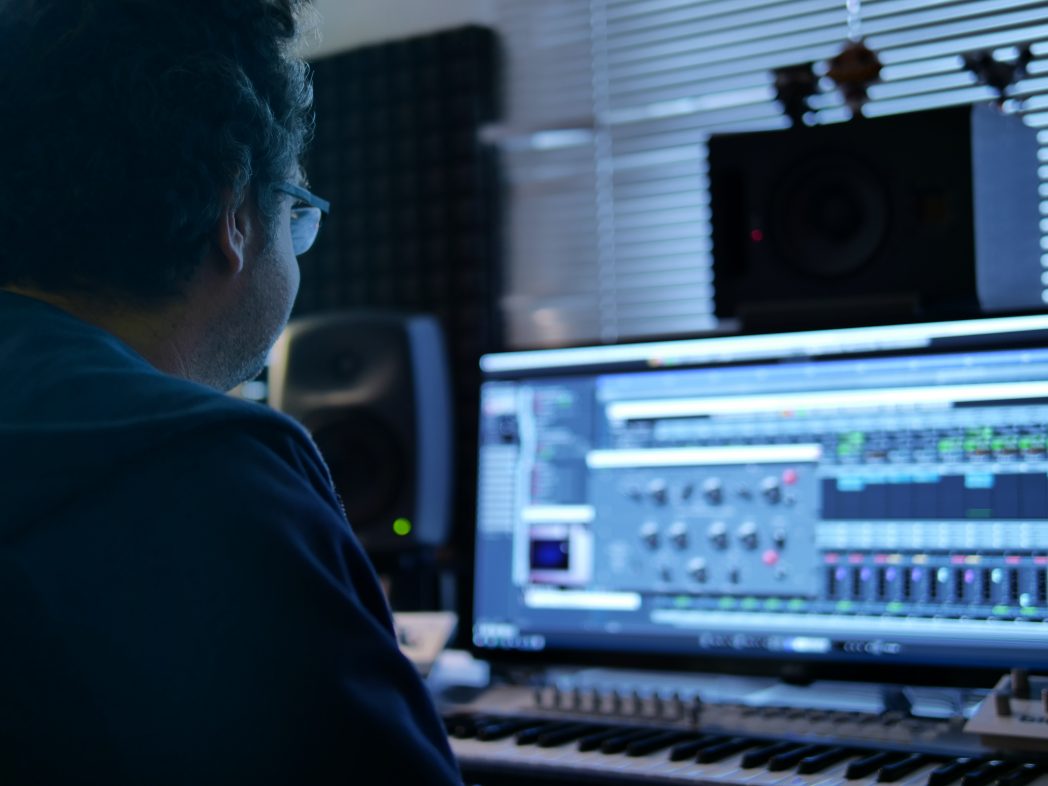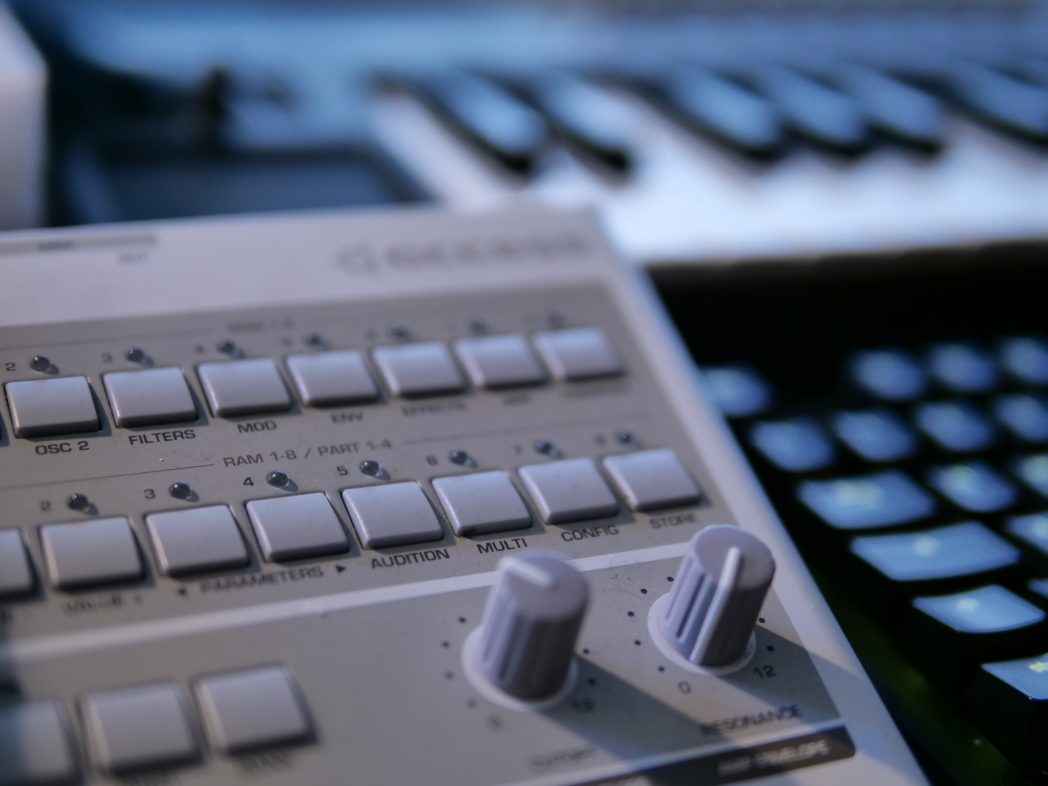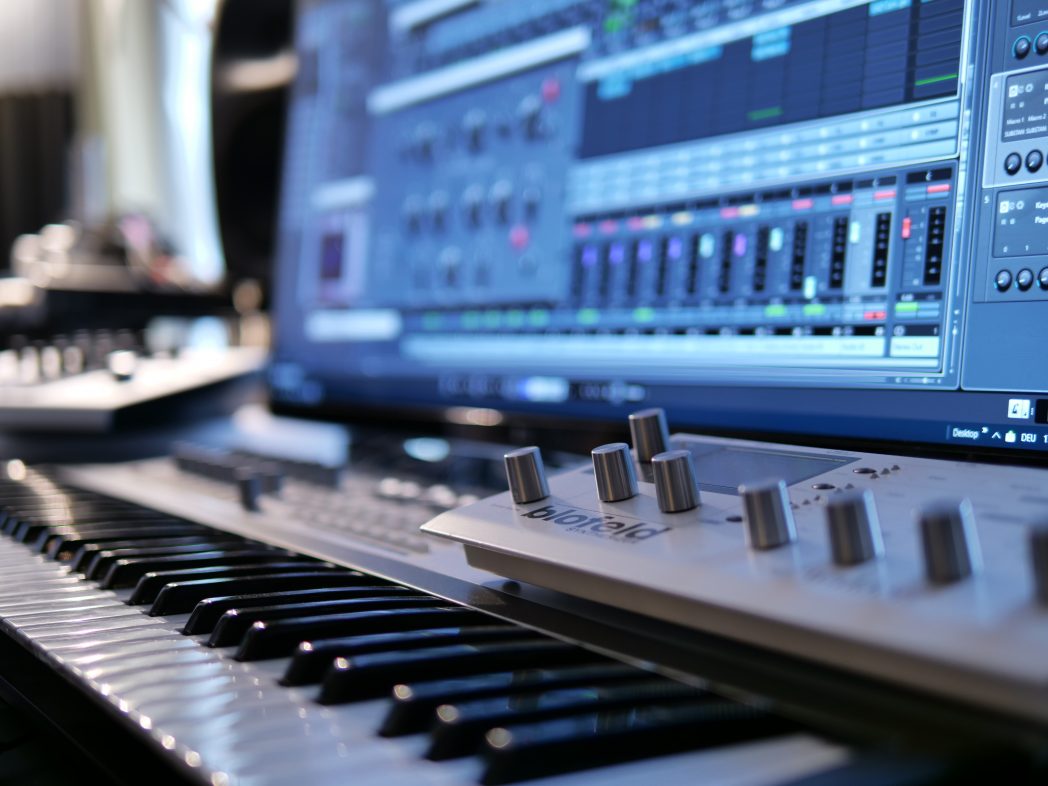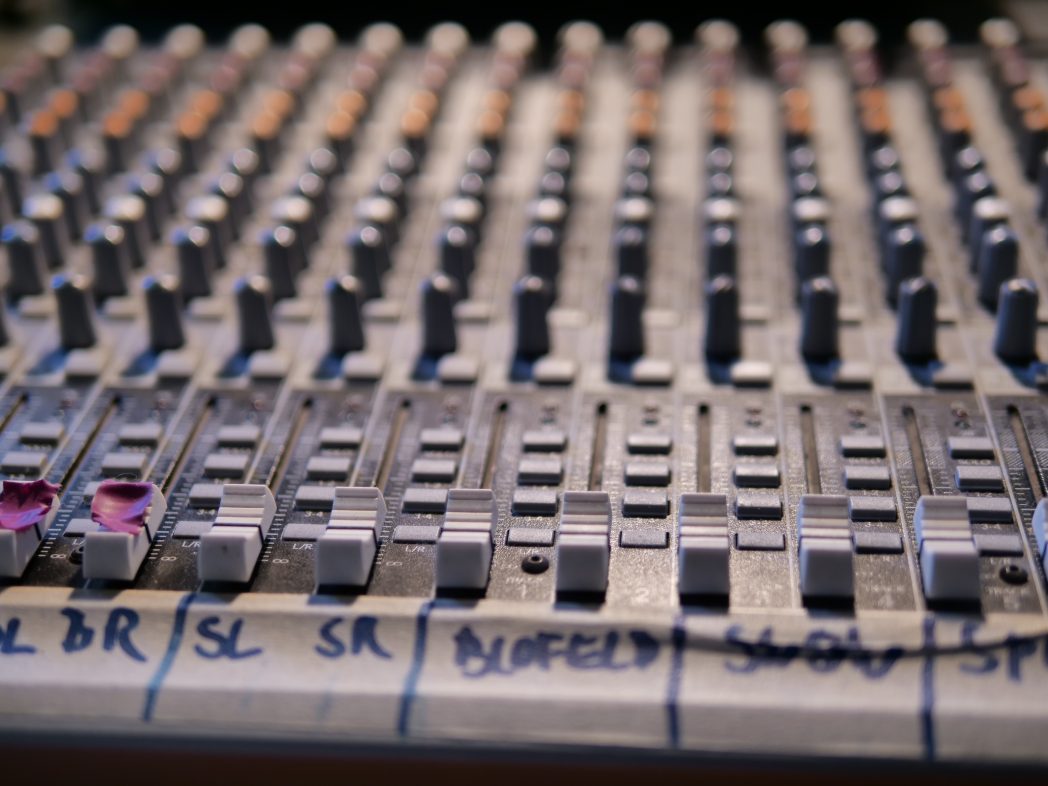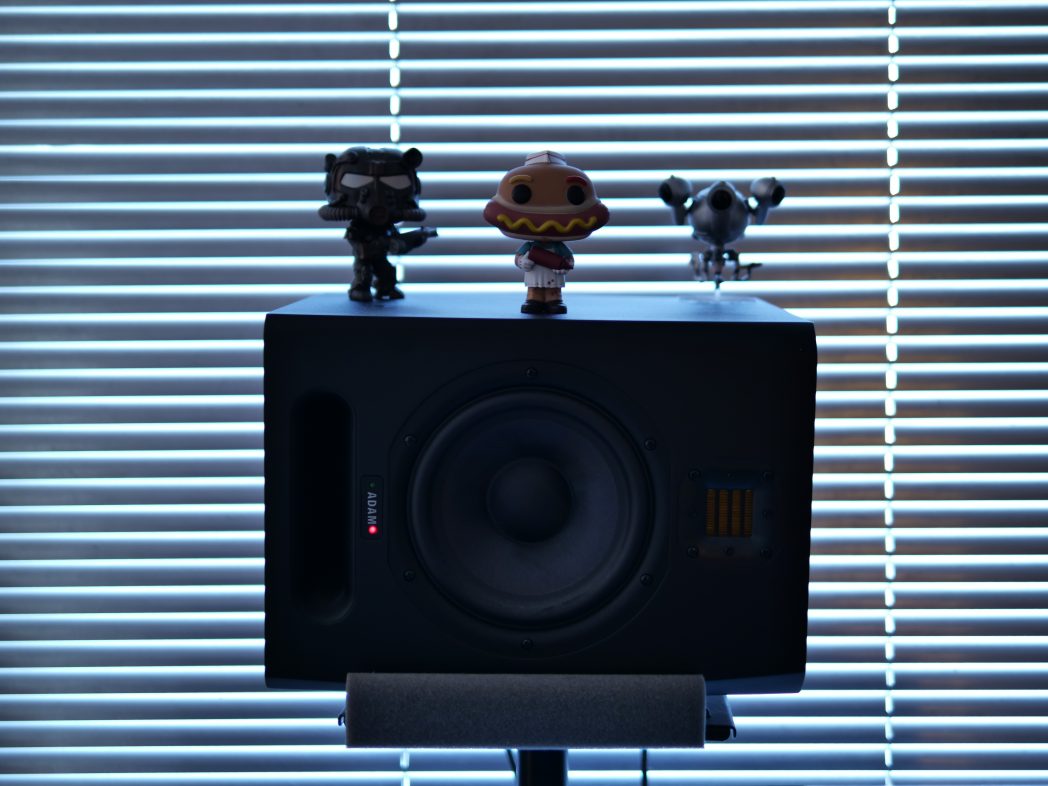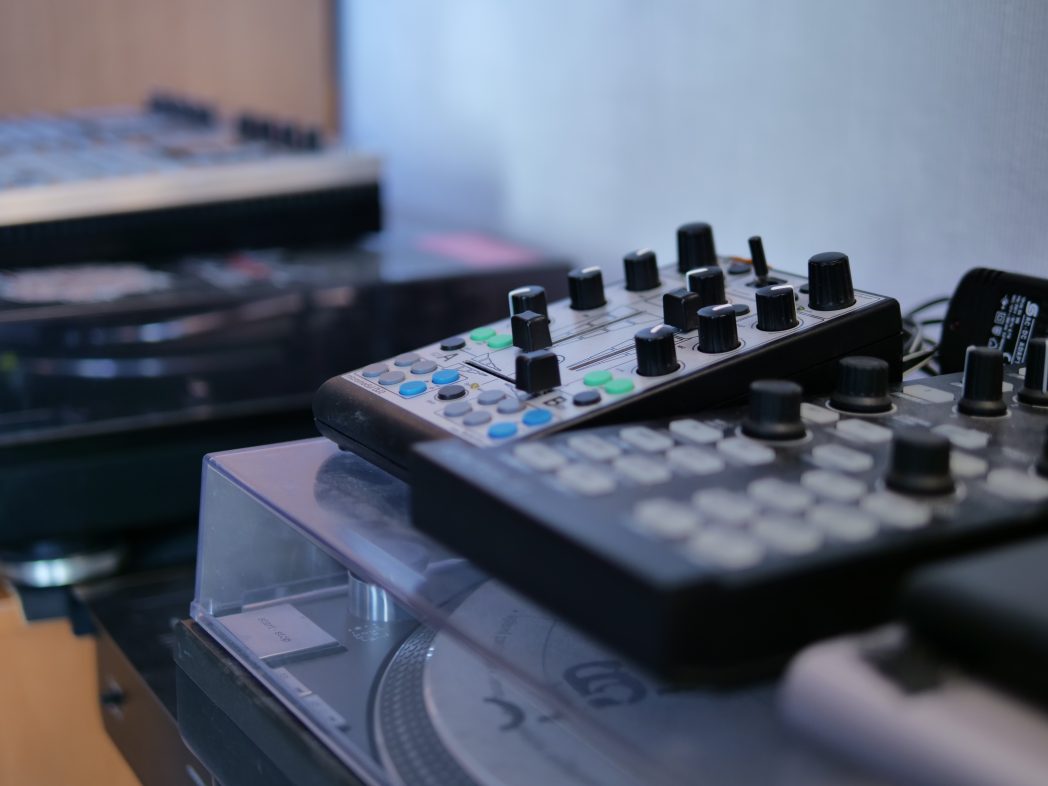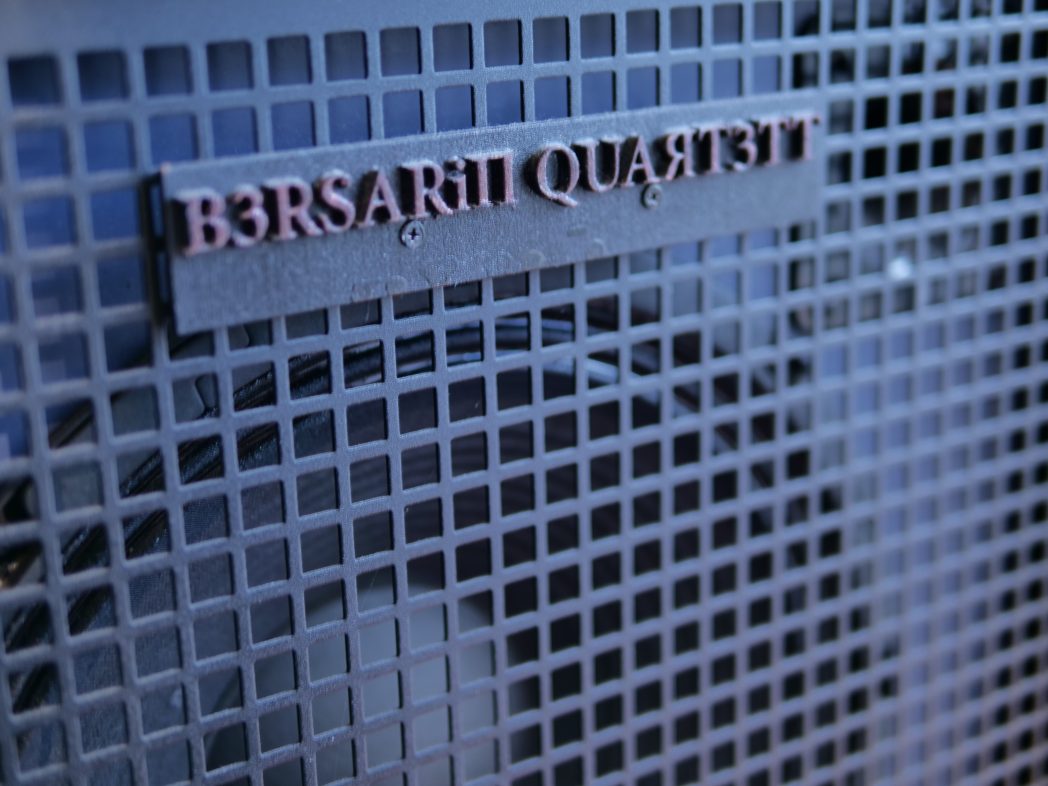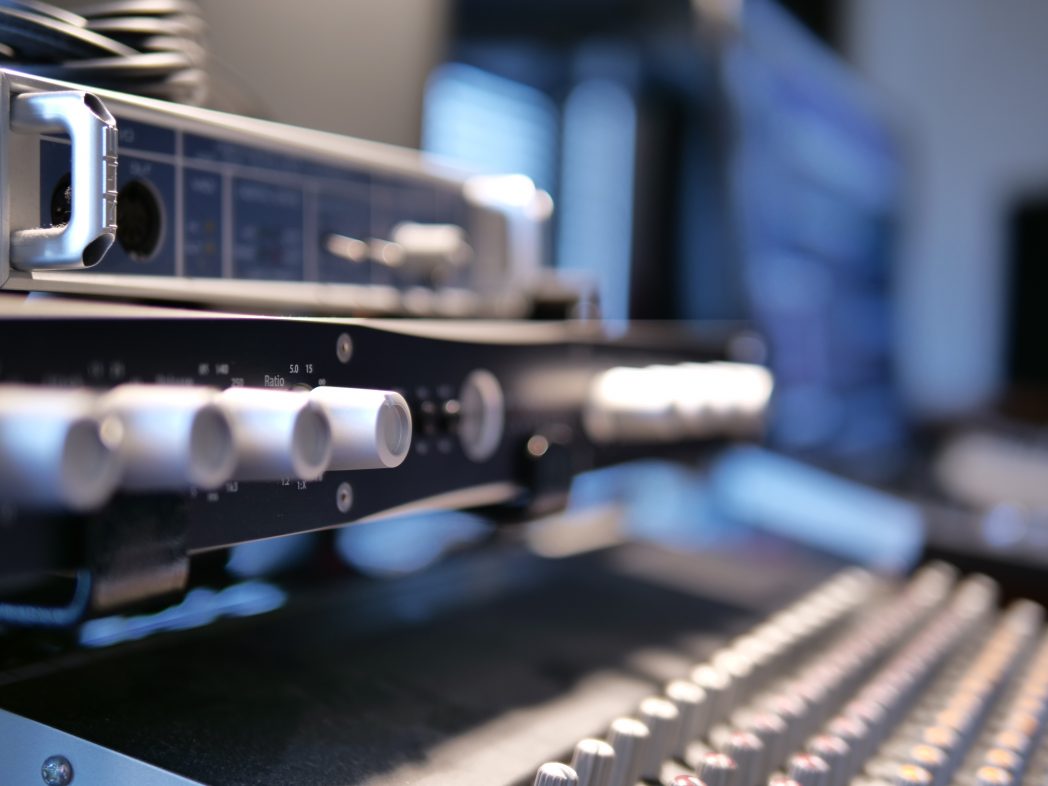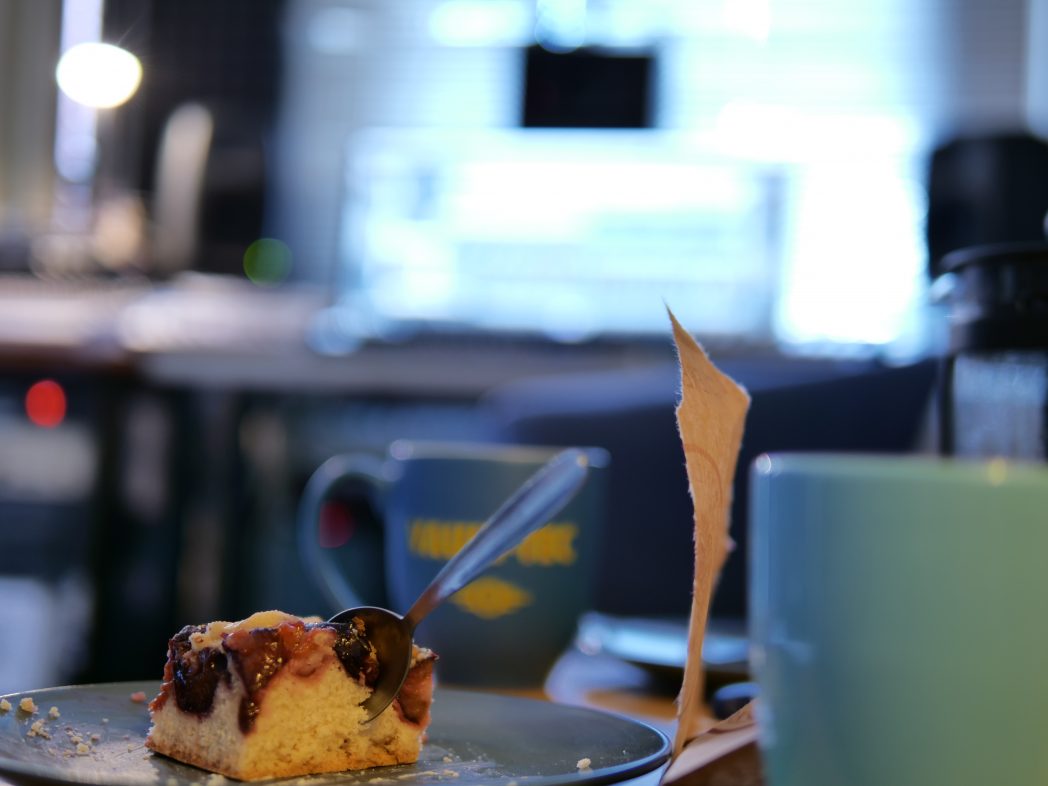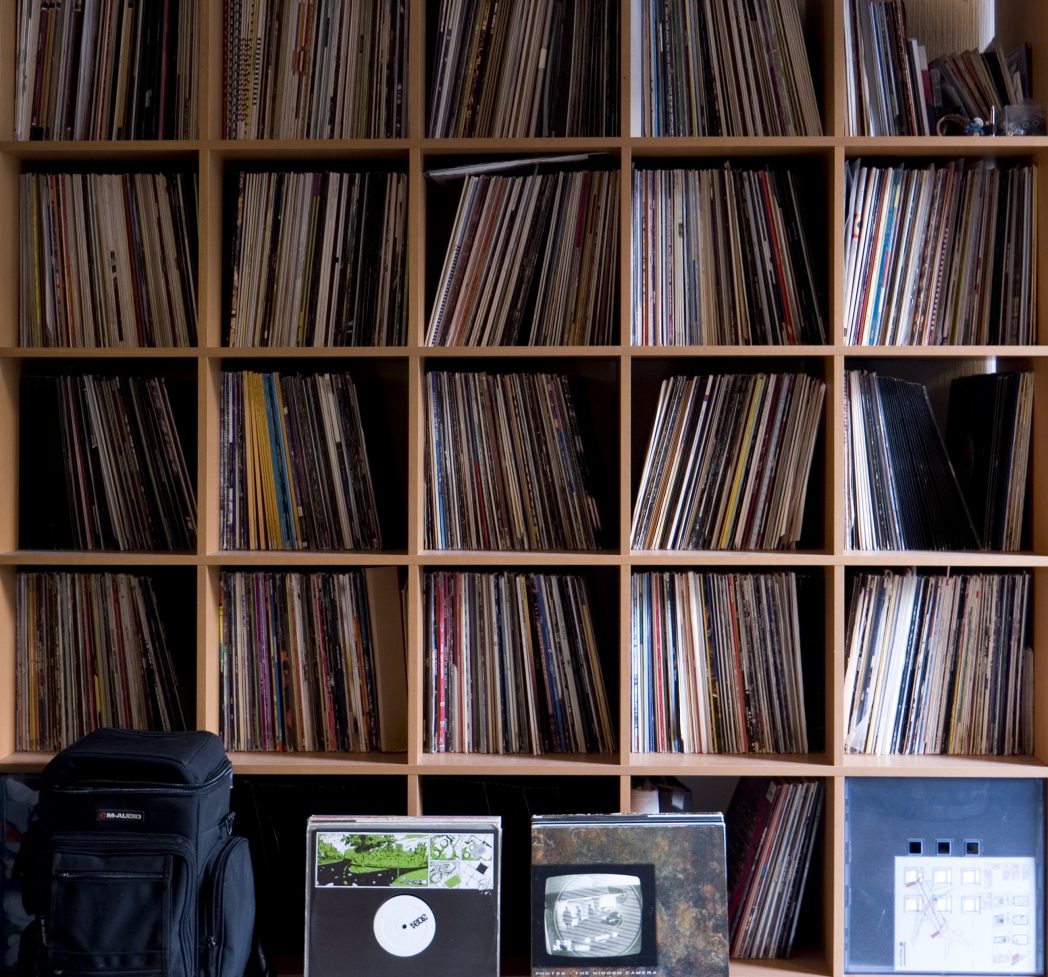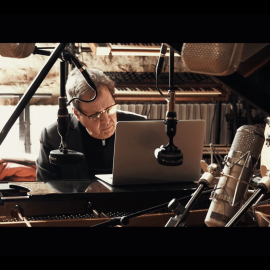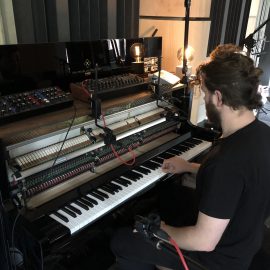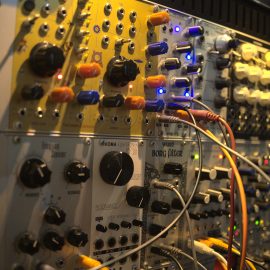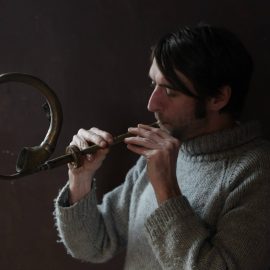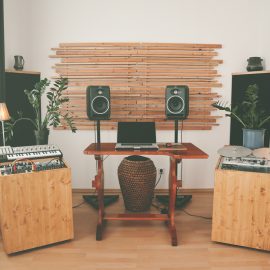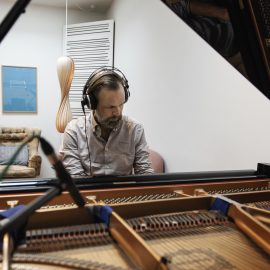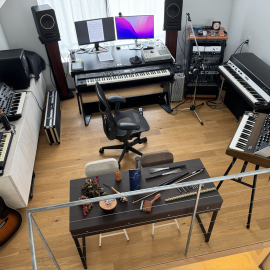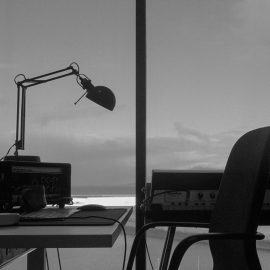Let’s start at the very beginning. Can you tell us how you got involved in composing, and what was your very first piece of gear? How many different studio iterations have you gone through, and what does your final setup look like right now?
In my childhood, I was very much into computer games. When I was 11 years old I made music with a C-64 and a crappy Yamaha PSR-keyboard. I was fascinated by the artistical output of the Amiga demoscene those days and I was totally mesmerized by the electronic music my older cousin played to me like Jarre, Tangerine Dream, The Art Of Noise, Kraftwerk. These soundscapes were so strange – this was the stuff I really wanted to do by myself (with a complete lack of knowledge and the absence of nearly professional equipment).
The first synthesizer (more a sample-rom-player) was a Korg M1 I got from my parents when I was 14 years old. I remember that this present was completely nuts because it was so expensive … probably this was a well calculated good investment to keep me busy, calm and quiet over my teenage years. (By the way: thanks a lot, Mom and Dad!) So I really wanted to get everything out of this box and I think these times were big times for me. The musical output was pretty terrible and I actually wouldn’t bother anyone with this crap (including myself) … but I can remember that it was tons of fun – especially for myself!
When I earned my first money with spare time jobs I bought my first sampler: the Yamaha TX 16W – one of the first stereo-sampler with 12-Bit resolution and ridiculous 1.5 MB (megabyte!) RAM, expandable up to even more ridiculous 6 MB. My setup constantly grew in the 90s. There was a Roland D-70, JP-8080, Waldorf Microwave, Nordlead 3 … you can call it the Atari ST-era. Some different Midi-Keyboards were still necessary to make a variety of sound layers because the computer processors were very slow, limited and expensive. End of the 90s friends of mine heard some of my very old demo tapes by accident and my moniker “Jean-Michel” was born. The Label “eleganz” was thrilled by this name and suggested to keep it – even my music was (luckily) quite different though …
Time goes by and when you are a student living in a small shared flat you are fed up sleeping under your hardware equipment someday — so I decided to get rid of all these black boxes and concentrate more on software-based tools for making music. Around 2000 I bought my first DAW (PC) and the possibilities seemed to be endless …
Today I’m still working with a DAW. It’s a PC with an Intel processor i7-6700K CPU 4GHz, 64 GB RAM, Cubase, Wavelab, Ableton Live, Bitwig Studio, RME Multiface II (soundcard), UAD-2, Mackie 16 VLZ (mixer), Arturia Keylab88 (Rehearsal Room), Novation 61SL MKII (Studio), Waldorf Blofeld, Virus TI Snow, Roland SP-404, Edirol R-44, Roland R-88, SPL Gold Mike, Elyssia Xpressor, 2x Genelec 8040, Genelec 7040 (Sub) and additional nearfield-monitors from Adam and Alesis for the sides and rears to have an improvised 7.1 surround sound setup. I use a lot the software by Native Instruments (especially Reaktor, Battery, Kontakt, Abysnth), Spectrasonics (Omnisphere, Keyscape), Arturia (V Collection 3, Pigments), U-He (Bazille, Colour Copy), KV331 (Synthmaster), Madrona Labs (Kaivo & Aalto), Softube (Weiss Mastering Compressor) and INA (GRM Tools).
Tell us about your favourite piece of hardware.
I think my most favourite hardware is my Genelec nearfield monitors. It’s the most used piece of hardware because I’m listening to music all the time. I trust the clear sound and got comfortable with them over the years. Other brands do their job as well I guess — I think it’s most important that you feel familiar with the sound of your own monitors and can trust them.
The second piece of hardware is a combination of hard- and software: I really like the DIGIcheck Totalyser from RME — it’s a frequency analyser software which comes with an RME soundcard for free. It helped me a lot to see and understand a good sounding mix. It´s fun for me to simply watch the flashing bars when I hear well-produced music I like.
Is there a particular piece of gear that you’re just dying to get your hands on and do you think one day you’ll have it?
If money would be no concern I really love to have all these outboard hardware units you use for professional mastering and analogue sound processing like the Manley Massive Passive, the gear of Dangerous Music, Vertigo Sound, Thermionic Culture, Drawner, Grand River, Chandler, SPL, … I really like to produce digitally, but it would be perfect if some waveforms can leave the digital black box for a moment to breath (and move) some fresh warm analogue air … and finally come back home to its binary world.
Can you please share some aspects of sound design in your work?
I try to combine organic analog sounds (recorded/sampled) with digital elements (granular-, fm-, physical modeling-, wavetable-, whatever-synthesis). It´s important to me to make some conscious decisions about the tonal depths of all these sounds to finally get an interesting big picture, which hopefully communicates/resonates with you. For designing this picture I try to take the “three axes” into account: the x-horizontal axis (the panning of the sound L/R), the y-vertical axis (the dynamic volume of the sound) and the z-depth axis (fore-/background with the dry/wet signal) — I’m happy with the result if all elements fit together and all make sense to me. (If something makes no sense it should at least be on purpose … and I can leave it as it is as well.)
Any particular new techniques that you tried out for your new album?
I guess from album to album I’m more and more focussed on sounds, noise, details — and I hope to progress with every release. I think in electronic music it’s all about progression – maybe in the art in general. Progression and resonation.
What does your live setup look like, and what do you bring with you when you travel for an extensive tour?
In my opinion, the only justification for playing live as an electronic musician is when the live-music is much different from your already released material. So last 2 years I performed some concerts together with the guitarist David Krützkamp. These concerts were arranged and produced especially for a 7.1 surround sound system. I liked the idea very much that there was no standard stage situation. Although the set has had some guitars and piano live parts, it was not important to watch this performance or to understand anything visually – it´s all about the individual listener and his/her own thoughts in complete darkness with the sounds coming from all directions.
As you can imagine it’s not that easy for promoters to organise a proper surround sound p.a. or either have some good contacts to modern movie theatres who are interested in promoting music events like this … so we were very lucky to have had the opportunity to perform some special concerts in Russia, Slovenia, Poland and Germany. Besides that, we found a nice local p.a. rental company for realising this concept perfectly — maybe there will be more performances to come … we will see.
This is what happened the last 2 years — so what’s coming up next?! I’m glad to have found three lovely mates in Münster to realise a new idea: to rearrange the music of my Bersarin Quartett-project for bass, guitar, drums and keys only. It’s about disarming/breaking down the quite complex artificial sound layers for a completely normal live set! That’s somehow a personal countermovement. Finally, there will be a stage with 4 human beings without any complex computer recordings or sequencers. (This is a bit crazy if you remember this all starts as a computer music project.) And I really don’t like the stage-situation for myself – to be honest, I hate it. 😀 But I really love this idea to present the music of the Bersarin Quartett this time in a most authentic, transparent, “honest and vulnerable” way as possible. Let’s find out if this will work out on the 23rd of November at Funkhaus Berlin — there will be a Denovali Evening and we are happy to share the stage with some great label mates. (TBA)
What is the most important environmental aspect of your current workspace and what would be a particular element that you would improve on?
I live in Münster at a small 2 room apartment over 15 years. And it’s great that my music studio is also my living space. But I really would love to have a room at another location though. It would be great to have an acoustically good sounding room where I can produce always at a high dynamic volume range at any time. (I care a lot about my neighbours at the moment. Since I’m into cinematic surround sound there were the first complaints – totally justified, because unfortunately, some auditions were after midnight I guess.)
What can you tell us about your overall process of composition? How are the ideas born, where do they mature, and when do they finally see the light?
It’s maybe very similar to all the other electronic musicians out there I think. At first, there is an interesting sound, a loop, a melody, a chord or a special chord sequence which haunts me. After this first sparkling impression, I add more and more elements to put this impression in an arrangement or sort of narrative. Generally, I’m doing way too much, because there are endless possibilities. It happens a lot that after some time all the magic from the first beginning is gone – so I have to do lots of “undos” and “resets” … new trials … in order to fail better. It’s really rare that you can catch this first sparkling moment in a final composition … but it’s not impossible.
A composition is finished when I think “ok … I can leave this as it is.” It’s never really finished of course but I have nothing to say to this anymore – and it still communicates/resonates with me. So I can leave this track in a good way.
After the piece is complete, how do you audition the results? What are your reactions to hearing your music in a different context, setting, or a sound system?
This is a really exciting moment. First I’m playing finished tracks to some friends of mine. And of course, I’m interested in their opinion … but most important is how I feel during this audition. If somebody said “Well, that’s not really my cup of tea.”, I’m totally fine with that as long as it works for me. But when I’m feeling uncomfortable showing some new material, that’s a good sign that this isn’t finished yet or not good enough or simply crap … (And a “Hey, that’s a good new track!” can’t help me either in that situation.)
Do you ever procrastinate? If so, what do you usually find yourself doing during those times? What gets you inspired?
Hell yeah … a lot! For me, it’s important to take some time to show efficiency the finger. For me, procrastination is a rebellion against diligence and this attitude of constant self-optimisation. I really like to waste my time – on purpose! And today we have such awesome tools to do so … Game of Thrones, Stranger Things, Rick & Morty, Netflix, Adult Swim, Twitch, Fallout 4/76, R6 Siege, … I love it all – and of course, it’s all inspiring!
And finally, what are your thoughts on the state of “electronic music” today?
Technically we live in awesome times I guess. Almost everybody can have these great tools for making professional sounding music — that’s fantastic because I know the times when I was very limited technically. So now everybody is making music at a high-quality level – and that’s great for sure!
At the same time, I feel that this technical revolution is doing something with my passionate perception of music. There are so many releases … so much good music … but where are the peaks today if everything is quite good? Albums you really burn for – you are really listening with a maximum of your attention. Some people told me: “The album format is dead anyway” – are they right? Great music magazines, record shops and favourite radio shows are gone as well. “These were the old days, man!” And if the algorithms getting better and better there is no lack of good music at all … everything is great and customized to your very own personal taste … (but this development could maybe morph into … superficial boredom caused by supersaturation!? Hopefully not!)
Don’t get me wrong: I like this technical revolution … all these possibilities … awesome! But the quantity is enormous — and I catch myself simply clicking through these pieces of stunning art offered by soulless playlists and social media links. I think to myself: This is quite new how you deal with music these days, right? So it’s a curious and paradox state: on the one hand the unbounded joy of all these great new possibilities and on the other hand the lack of attention caused by digital quantity – worst case right up to whateverism.
At the end I’m optimistic because there will be always really marvellous music out there … so let’s see which direction all these “clicks”, “likes” and “playlists” will take – the party just has started! 🙂
Photography © andré kleine-wilke
